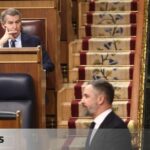
Germany will be the first test of the year that measures the strength of an international extreme right emboldened by tycoon Elon Musk and his followers. The radical Alternative for Germany party will achieve its best results in a national election since its birth in 2013 and is second in the polls, only behind the conservatives of the CDU.
What happens in the country on February 23 will mark the destiny of Europe. The year also begins with the inauguration of Donald Trump, scheduled for January 17, another success for the global far-right.
A walk through the trends of the social network with artificial intelligence that defame minorities and present what paradise on earth will be like when the far-right Alternative for Germany (AfD) governs the country, all sprinkled with a good dose of ethnic nationalism.
The social network owned by Elon Musk does not hide its bias towards Germany, a country in which the tycoon has economic interests – the first Tesla car factory is in the state of Brandenburg, near Berlin. But Musk’s interest in Europe’s largest economy goes beyond his investments. Donald Trump’s advisor has been openly supporting the AfD for months and attacking the rest of the country’s parties and political figures.
In his X profile, Musk has repeatedly insulted both the German Federal Chancellor, the Social Democrat Olaf Scholz, and the Federal President, Frank-Walter Steinmeier, the country’s two main political authorities. After the attack at a Christmas market in Magdeburg on December 20, he wrote: “Scholz should resign. “He is an incompetent idiot.” On December 31, Steinmeier became the target of their attacks: “He is an undemocratic tyrant.” In both cases, their comments were responses to posts by influencers aligned with the narratives trumpist and far-right.
Merz’s loyal opposition
The reaction to Musk’s attacks has not been long in coming. In his New Year’s speech, Scholz responded without mentioning the billionaire: “It is not the owners of social networks who decide,” the chancellor said. After announcing the dissolution of Parliament and confirming the call for early elections for next February 23, the federal president also reacted. Steinmeier called for the use of “fair and transparent means” and warned about “foreign influences, especially strong in X.”
The leader of the opposition and main candidate to succeed Scholz, the conservative Friedrich Merz, has joined the criticism of Scholz and Steinmeier, thus avoiding unfair competition with the Social Democrats. Merz considers Musk’s public call in favor of the AfD “arrogant” and claims to not remember “a comparable case of meddling in an electoral campaign of an allied country in the history of Western democracy.”
Musk understands the moment of weakness that Germany and its institutions are going through, with an economic recession caused by an outdated economic model and a lack of public investment in key issues such as infrastructure or the high-speed Internet network. Although German authorities, both federal and regional, courted Musk in the past to invest in Germany, today the tycoon about trump turns against those same authorities. The early elections on February 23 have thus become a battle with the global extreme right, in whose narratives the figure of Musk increasingly stands out.
“Germany should dare to have more Milei or Musk.” This was said by Christian Lindner, president of the German liberal party FDP, after being expelled from the German tripartite government by Chancellor Scholz. The breakup of the ‘traffic light coalition’ government thus gave way to the breakup of another taboo in Germany: the public commitment to the “anarcho-capitalism” of the Argentine president or to the authoritarian market dogmatism represented by the richest man on the planet.
Lindner opens the door to a model that undermines all the consensus of the social market economy on which the political system of the Federal Republic of Germany has developed after the trauma of Nazism and the Second World War. The former finance minister and liberal leader seems to be desperately trying to get his party out of the federal Parliament, as most polls predict.
But Lindner’s statement was not the last gesture to normalize in Germany the positions of the global far-right represented by Musk. The diary The worldowned by the Springer group – which also publishes the tabloid Picture newspaperwith nationalist and conservative positions – recently published a tribune of Elon Musk. In it, the tycoon makes a strong defense of the AfD, a party that he presents as “the last spark of hope” for Germany.
Musk presents Alternative for Germany as a party in favor of reducing bureaucracy and public spending, which is committed to a more restrictive immigration policy and as the only political option that wants to preserve culture and “German identity.” The brief text does not refer to the tendencies close to neo-Nazism, represented by the leader of the AfD in Thuringia, Björn Höcke, nor to the surveillance of the party by the intelligence services nor to the AfD program betting on a referendum on Germany’s departure from the European Union.
The head of opinion of The world argues the publication of Musk’s tribune as a way to open the debate on AfD positions that the newspaper’s editorial line officially rejects. In fact, the opinion leader himself is in charge of refuting some of Musk’s positions, because “a genius can also be wrong,” writes the journalist.
Despite all the objections that the head of the Springer group may make, Musk’s objective has already been achieved: to introduce his positions even more to the center of the German public debate. The next big action planned by the owner of your social network.
Source: www.eldiario.es

